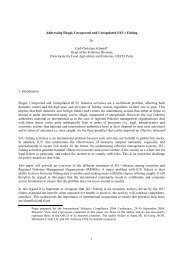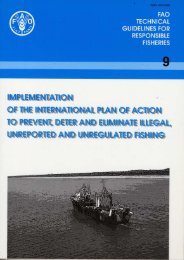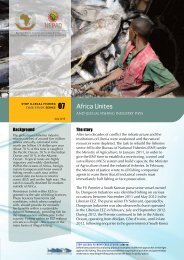Fishing Vessel Monitoring Systems: Past, Present and Future
Fishing Vessel Monitoring Systems: Past, Present and Future
Fishing Vessel Monitoring Systems: Past, Present and Future
Create successful ePaper yourself
Turn your PDF publications into a flip-book with our unique Google optimized e-Paper software.
VMS: <strong>Past</strong>, <strong>Present</strong> <strong>and</strong> <strong>Future</strong> 39<br />
6.4 Networking solutions<br />
Were there no central organization, the most logical solution would be to serve<br />
the needs of data distribution by implementing a wide-area network consisting of<br />
data gathering systems operated by regional fisheries organizations. This<br />
approach would require a higher degree of technical co-operation than the more<br />
centralized architecture in that it would require communication between an<br />
inevitably broad range of information technology installations, each developed<br />
according to an individual functional <strong>and</strong> technical specification.<br />
On a functional basis, the overall network would consist of a series of<br />
connections between regional organizations. For security reasons, it is likely that<br />
data access would be h<strong>and</strong>led on a query clearinghouse basis, rather than by<br />
direct access. In an operational scenario, a coastal state requiring data on a<br />
given vessel would address a request to its own regional fisheries organization.<br />
That organization would respond with any data it already held on the vessel <strong>and</strong><br />
address the request to all of the other organizations that made up the network.<br />
These entities would, in turn, address their data to the original regional<br />
organization, which would forward the responses to their member.<br />
The very complexity of such an operation underlines the fact that the only<br />
advantage of such an implementation, in fact, would be political: there would be<br />
no need to reach international agreement on a single entity for world-wide data<br />
storage <strong>and</strong> distribution. Were it possible to reach such agreement, however, the<br />
overall effort would benefit from simpler, more reliable operations <strong>and</strong> lower<br />
operating costs.<br />
6.5 Nascent international cooperation<br />
Encouragingly, there is already some concrete indication of desire <strong>and</strong><br />
willingness to share data on IUU vessels at the international level. Perhaps the<br />
most active organization at the moment is the North East Atlantic Fisheries<br />
Commission, based in London, that maintains two list of vessels known, or<br />
suspected of IUU activity.<br />
When one of its contracting parties reports a vessel as likely IUU, it is entered<br />
into NEAFC’s “A list”. This puts the vessel operators on notice of the suspicions<br />
<strong>and</strong> gives them an opportunity to clear it. One year later, assuming that the<br />
vessel remains suspect, it moves to NEAFC’s “B-list” where it remains<br />
“permanently”, or at least until a decision is made, by the NEAFC annual<br />
assembly, to remove it. The identities of vessels entered on both lists are<br />
available to the public on the NEAFC website.

















